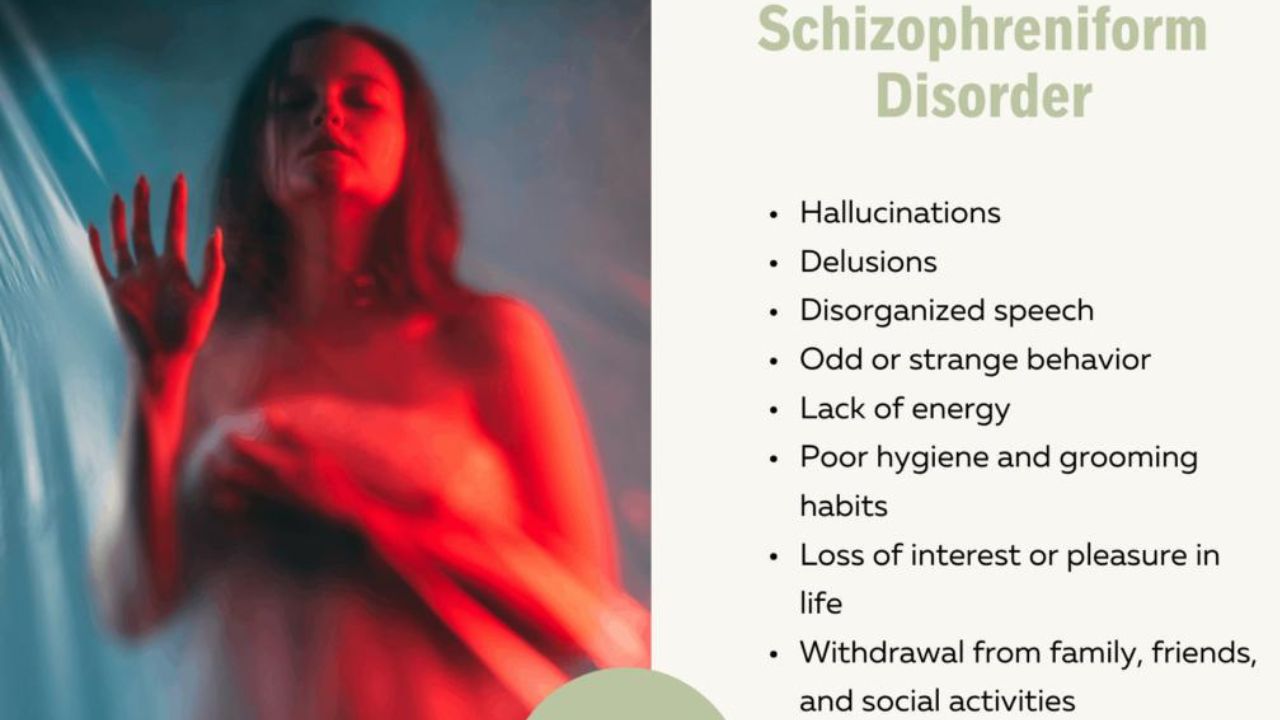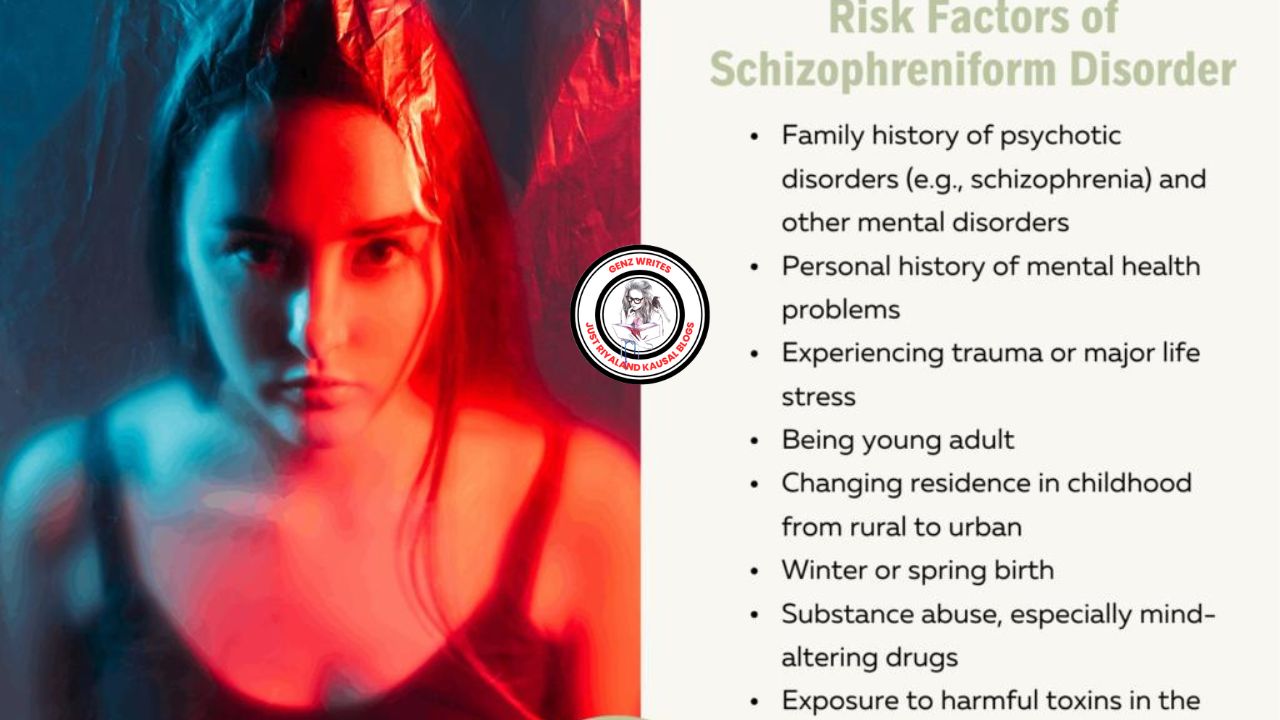Schizophreniform disorder is a mental health condition characterized by symptoms similar to schizophrenia but with a shorter duration. Unlike schizophrenia, which is a long-term condition, schizophreniform disorder lasts for at least one month but less than six months.
Individuals with schizophreniform disorder experience a break from reality, often marked by:
- Hallucinations: Perceiving things that aren't there (e.g., hearing voices, seeing things)
- Delusions: Holding firmly to false beliefs (e.g., believing one is being persecuted)
- Disorganized speech or behavior: Difficulty communicating clearly or engaging in unusual actions
Essentially, schizophreniform disorder is a diagnostic category used when psychotic symptoms are present for a significant period but not long enough to meet the criteria for schizophrenia. It's often seen as a precursor or potential pathway to schizophrenia. Follow us here at Katie Holmes.

Specifiers for Schizophreniform Disorder
Unlike many other mental health disorders, schizophreniform disorder does not have specific specifiers.
The diagnosis primarily focuses on the duration of symptoms (at least one month but less than six months) and the presence of core psychotic symptoms. Once these criteria are met, a diagnosis of schizophreniform disorder is made.
However, it's important to note that clinicians often consider additional factors, such as:
- Precipitating stressors: Any significant life events or stressors that may have triggered the psychotic episode.
- Family history of mental illness: A family history of psychotic disorders can be relevant.
- Symptom severity: The intensity of psychotic symptoms can vary among individuals.
- Global assessment of functioning: Evaluating the overall impact of the disorder on daily life.
Signs and Symptoms
The Schizophreniform disorder shares many symptoms with schizophrenia. The key difference lies in the duration of symptoms.
Core symptoms include
- Delusions: These are fixed, false beliefs that are not based on reality.
- Hallucinations: Perceiving things that aren't there (e.g., hearing voices, seeing things).
- Disorganized speech: Difficulty communicating, making sense, or staying on topic.
- Disorganized or catatonic behavior: Acting in unusual or unpredictable ways, or remaining motionless.

Additional symptoms may include
- Paranoia: Feeling suspicious or persecuted.
- Mood changes: Experiencing extreme highs or lows.
- Difficulty concentrating: Trouble focusing or paying attention.
- Problems with memory: Difficulty remembering things.
Prevalence and Demographics
Prevalence
- Schizophreniform disorder is relatively rare compared to other mental health conditions.
- Exact prevalence rates vary across studies and populations due to the challenges in diagnosis and the often brief duration of the disorder.
- It is estimated to account for a small percentage of all psychotic disorders.
Demographics
- Age of onset: Typically occurs in late adolescence or early adulthood.
- Gender: While there are some variations in studies, generally, the disorder affects men and women equally.
- Socioeconomic status: Lower socioeconomic status may be associated with a higher risk, but this is not definitively established.
- Cultural factors: The expression and interpretation of symptoms can vary across cultures, potentially influencing diagnosis rates.

Risks and Prognostic Factors
Risks
While the exact causes of schizophreniform disorder are unknown, several factors may increase the risk:
- Genetic predisposition: A family history of psychotic disorders can increase the likelihood of developing the condition.
- Brain chemistry: Imbalances in neurotransmitters may contribute to the development of psychotic symptoms.
- Environmental factors: Stressful life events, substance abuse, or exposure to certain toxins during pregnancy may increase risk.
- Obstetric complications: Complications during pregnancy or childbirth have been linked to an increased risk of psychotic disorders.
Prognostic Factors
Factors that influence the outcome of schizophreniform disorder include:
- Duration of symptoms: A shorter duration of symptoms is associated with a better prognosis.
- Premorbid functioning: Individuals with a strong history of social and occupational adjustment tend to have better outcomes.
- Family support: Strong family support can contribute to a positive outcome.
- Early intervention: Timely treatment can help prevent complications and improve recovery.
- Presence of negative symptoms: A greater number of negative symptoms (e.g., flat affect, lack of motivation) may indicate a poorer prognosis.
Development and Course
Development
The onset of schizophreniform disorder is typically *acute and rapid*. Unlike schizophrenia, where symptoms may develop gradually over time, schizophreniform disorder often begins abruptly. The specific triggers for the onset are not fully understood, but stress, substance abuse, or underlying biological factors may play a role.
Course
The defining characteristic of schizophreniform disorder is its *short duration*.
- Recovery: Approximately one-third of individuals with schizophreniform disorder experience full recovery within six months.
- Transition to Schizophrenia: In about two-thirds of cases, the symptoms persist beyond six months, leading to a diagnosis of schizophrenia.
- Other Outcomes: In some cases, the condition may evolve into schizoaffective disorder or a mood disorder with psychotic features.
It's important to know that while the overall course of schizophreniform disorder is often shorter than schizophrenia, it can still have a significant impact on an individual's life during the active phase of the illness. Early intervention and treatment are crucial for improving outcomes.
Associative Features Supporting Diagnosis
While schizophreniform disorder doesn't have specific specifiers, certain associated features can help clinicians in making a diagnosis. These features are often observed alongside the core symptoms of delusions, hallucinations, disorganized speech, and behavior.
General Associative Features
- Negative symptoms: These include a decrease in emotional expression, lack of motivation, and social withdrawal.
- Cognitive impairments: Difficulties with attention, memory, and problem-solving.
- Mood disturbances: Depressive or manic symptoms may be present.
- Social and occupational dysfunction: Impairment in relationships, work, or school.
Specific Associative Features
- Premorbid adjustment: Information about the individual's functioning before the onset of symptoms can be helpful. Good premorbid adjustment may suggest a better prognosis.
- Family history: A family history of psychotic disorders can increase the likelihood of schizophreniform disorder.
- Medical conditions: Certain medical conditions can mimic psychotic symptoms.
Functional Consequences
Schizophreniform disorder can significantly impact a person's ability to function in various areas of life. The specific consequences can vary depending on the severity of symptoms and the individual's coping mechanisms.
Common Functional Consequences
- Social Impairment: Difficulty maintaining relationships, social isolation, and withdrawal due to paranoia, delusions, or unusual behavior.
- Occupational or Academic Difficulties: Challenges in completing tasks, meeting deadlines, or interacting with colleagues or classmates due to cognitive impairments and difficulty concentrating.
- Self-care Issues: Neglect of personal hygiene, difficulty managing daily living activities, and problems with nutrition and sleep.
- Legal Problems: Engagement in behaviors that can lead to legal difficulties, such as property damage, threats, or violence.
- Financial Difficulties: Challenges with managing finances, leading to debt, homelessness, or reliance on others for support.
Differential Diagnosis
Differential diagnosis involves distinguishing schizophreniform disorder from other conditions that may present with similar symptoms. It's crucial to accurately diagnose schizophreniform disorder to ensure appropriate treatment.
Conditions to consider
- Schizophrenia: Distinguished by a longer duration of symptoms (more than six months).
- Brief Psychotic Disorder: Characterized by a shorter duration of psychotic symptoms (less than one month).
- Schizoaffective Disorder: Presence of concurrent mood disorder (major depressive or manic episode) with psychotic symptoms.
- Delusional Disorder: Absence of other psychotic symptoms like hallucinations or disorganized speech.
- Mood Disorders with Psychotic Features: Bipolar disorder or major depressive disorder with psychotic symptoms.
It's essential to conduct a thorough evaluation, including a comprehensive medical and psychiatric history, physical examination, and potentially laboratory tests, to accurately differentiate schizophreniform disorder from other conditions.
Impact of Schizophreniform Disorder on Life
Schizophreniform disorder can significantly disrupt a person's life, although the impact is often less severe and shorter-lived compared to schizophrenia. The severity of the consequences depends on the intensity of the psychotic symptoms and the individual's coping mechanisms.
Common Functional Consequences
- Social Impairment: Difficulty maintaining relationships, social isolation, and withdrawal due to paranoia, delusions, or unusual behavior.
- Occupational or Academic Difficulties: Challenges in completing tasks, meeting deadlines, or interacting with colleagues or classmates due to cognitive impairments and difficulty concentrating.
- Self-care Issues: Neglect of personal hygiene, difficulty managing daily living activities, and problems with nutrition and sleep.
- Legal Problems: Engagement in behaviors that can lead to legal difficulties, such as property damage, threats, or violence.
- Financial Difficulties: Challenges with managing finances, leading to debt, homelessness, or reliance on others for support.
Treatment and Management
Treatment for schizophreniform disorder typically involves a combination of medication and psychotherapy. The goal is to manage symptoms, prevent relapse, and improve overall functioning.
Medication
- Antipsychotics: These are the primary treatments for managing psychotic symptoms like hallucinations and delusions.
- Mood stabilizers: In some cases, mood stabilizers might be added to address mood fluctuations or bipolar-like symptoms.
- Antidepressants: If depression is present, antidepressants may be considered, but they should be used cautiously as they can potentially worsen psychotic symptoms.
Psychotherapy
- Cognitive-behavioral therapy (CBT): Helps a person understand and challenge delusional thoughts, improve coping skills, and reduce stress.
- Supportive therapy: Provides emotional support and helps a person cope with the challenges of the disorder.
- Family therapy: This can improve communication and support within the family.
Additional Considerations
- Hospitalization: In many cases, hospitalization may be necessary for patient safety and to stabilize symptoms.
- Social support: Encouraging involvement in social activities and support groups can help reduce isolation.
- Vocational rehabilitation: Assisting individuals in returning to work or school can improve self-esteem and independence.
It's important to note that treatment for schizophreniform disorder is often a long-term process, and improvement may be gradual.
Regular follow-up with a mental health professional is essential to monitor symptoms and adjust treatment as needed.